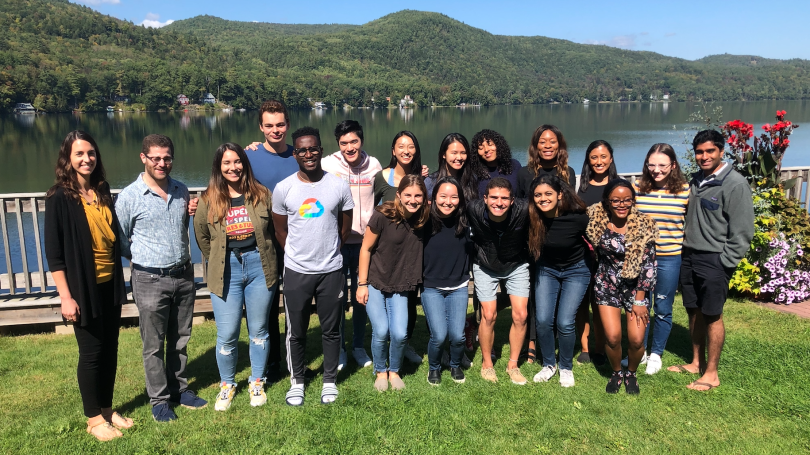
- Public Policy
- Leadership
- Funding
- News & Events
- About the Center
Back to Top Nav
Back to Top Nav
Back to Top Nav
Back to Top Nav
Sarah-Marie Hopf’s session entitled "Leading in a Noisy World: How Intentional Solitude Can Help You Be An Effective and Resilient Leader" necessitated self-reflection about our own understandings of and relationship with solitude.
Sarah-Marie Hopf is a graduate of the College from the class of 2013. While at Dartmouth, she participated in the Rockefeller Leadership Fellows program and graduated with a BA with Honors in Anthropology modified with Economics and Development Studies. In her professional career, Hopf is deeply invested in the practices of mindfulness and meditation.
She is currently part of Jack Kornfield and Tara Brach’s 2-year Mindfulness Meditation Teacher Certification Program, certified through UC Berkeley’s Greater Good Science Center and the Awareness Training Institute. Hopf is also an experience designer, integral coach, and social innovation strategist. She founded Thriving in a Noisy World which seeks to assist leaders in developing their skills in mindfulness and resilience in our 21st century world.
Hopf’s session kicked off the second day of the fall retreat for the Class of 2020 Rockefeller Leadership Fellows. As we eagerly awaited diving into the day’s activities, Hopf introduced to us the concept of solitude as impacting our leadership skills. She began with an introduction of her own experience with meditation and mindfulness. She also emphasized using mindfulness and meditation as techniques to cultivate greater self-awareness. This is especially important in today’s world because we are constantly being bombarded by digital notifications and distractions.
To further emphasize this point, Hopf distributed papers to each of the fellows. During a short quiet reflection time, each fellow wrote down answers to questions that interrogated their own experiences with solitude.
One of the striking points of this exercise that stood out to me was Hopf’s question about noise. She asked, “What is the noise in your life?” I found this question compelling because it sought to define what distracts us and needlessly takes up mental space.
Following our personal reflection time, we discussed our thoughts with our peers. The diversity in our answers was fascinating. We all identified some kind of “noise” in our lives from the constant notifications to other’s perceptions of our personalities to our own insecurities.
Hopf then moved the discussion to how we can combat our noise. She concluded with affirming the importance of maintaining a strong sense of oneself and developing strategies to block out our noise. Such skills are essential for effective leadership.
Ultimately, Hopf’s articulation of solitude and resilience helped to strengthen our collective conceptualizations of effective leadership. Hopf’s session marked the beginning of what will undoubtedly a productive yearlong discussion of leadership building.
-Written by Alex Keith, Class of 2020 Rockefeller Leadership Fellow
As Rockefeller Leadership Fellows, seniors gain a better understanding of the qualities and responsibilities expected of leaders. As Fellows take part in the workshops, dinner discussions, and team-building exercises, they examine their skills, qualities, and attributes as leaders and analyze how these influence teamwork and achieving goals.